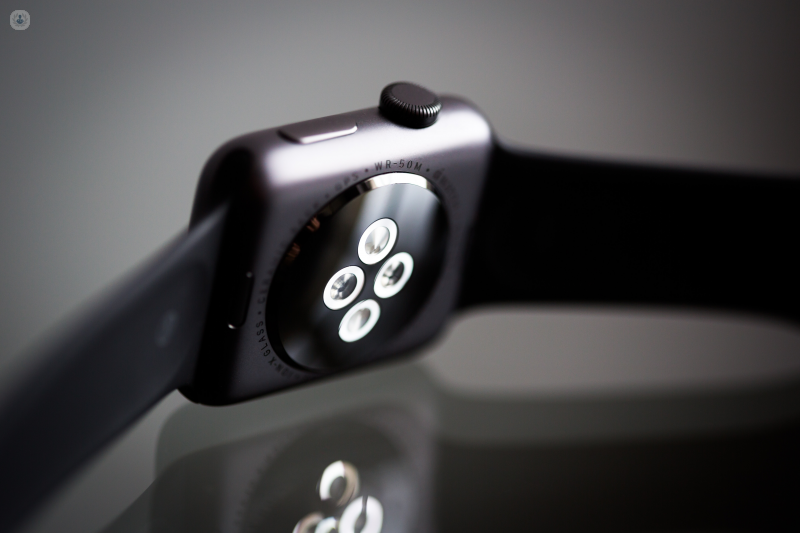Can you really monitor your heart with your watch?
Written by:As mankind races into the future, our technology keeps leaping forward. Innovations like the Apple Watch and Fitbit feature heart rate monitors attached to our wrists, which not only allow us to keep an eye on our fitness, but also open up the possibility of using watches to help spot issues with heart health. Expert cardiologist Dr Boon Lim is here to explain:

What can a heart rate monitor tell you about someone’s risk of atrial fibrillation (AF) or stroke?
A heart rate monitor, easily accessible on most modern mobile phones or dedicated heart rate trackers, is a device that is easily accessible for anybody to track their heart rate. These monitors typically detect bio-signals generated by the body, and are generally divided into those which monitor impedance (opposition to an electrical current) or light. Both aim to detect heart rate, but there IS a difference between the two.
The difference between technologies
Standard medical grade equipment like the 12-lead electrocardiogram (ECG) uses impedance-based measurements, which detect electrical signals generated by the beating heart at the body’s surface. ECG sensors make contact with two points on the skin to create a circuit in order to pick up these electrical signals.
The other (more available) sensor is a photoplethysmography (PPG) sensor, commonly known as green light technology. This uses an LED and light sensor to record data related to blood flow, which is controlled by the heart’s pumping action (i.e. flow arises AFTER cardiac contraction generated by the electrical signals).
Which sensor is more accurate?
ECG measures heart rates accurately, and is the gold standard for medical devices. The AliveCor Kardia mobile device, available as a standalone product or as a band on the watch is an FDA-approved device which accurately performs an ECG. Furthermore, there are algorithms which can be applied to the signals to help make a diagnosis, typically of atrial fibrillation (the most common heart rhythm disturbance).
The Apple Watch 4, launched September 2018, is a device with potential ECG technology, but at the time of writing, remains untested. We will be looking to test this out against other technologies at Imperial College London, in conjunction with technology companies to innovate in the digital wearables space.
PPG is typically used to detect if your average heart rate is too fast or too slow. Heart rate readings tracked by these algorithms tend to lag by a few seconds to compensate for movement and ambient light, and will not be accurate for beat-to-beat characterisation of heart rhythm abnormalities. Examples of wearables using PPG include Fitbit and most mobile phones.
Again, we are studying this technology further at Imperial College, putting PPG to the test to compare its accuracy against conventional medical-grade ECG devices.
The most important medical application of current ECG-based devices is in the detection of atrial fibrillation (AF), which is the most common heart rhythm abnormality, affecting up to 5% of the population above 65 years old, and up to 2 million people in the UK. AF increases the risk of stroke by 3-5 times and early detection allows appropriate treatment to minimize the risk of this.
Is a normal heart rate a good indication that someone’s heart is healthy?
The “normal” range of heart rates in patients is from 60 to 100bpm. Anything below 60bpm is considered bradycardia (slow heart rate) and above 100bpm tachycardia (fast heart rate).
The heart rate is dependent on many factors, including age, general fitness and conditioning, and mental/physical activity, and can vary wildly between states of rest, such as during sleep, and states of activity, such as during exercise, and in response to other stressors. Because of this, the heart rate per se is not generally used to indicate the state of health. What may be more important medically as an indication of overall health is the heart rate variability.
What other symptoms should someone be aware of?
Red flag symptoms including chest pain, dizziness, fainting and rapid unexpected palpitations. If you have any of these symptoms, please consult your doctor for further advice.
However when experiencing palpitations, which are defined as symptoms of an abnormal heart beat, including abnormal rate or rhythm, an ECG-based device such as the AliveCor, can be incredibly useful in helping your cardiologist make a medical diagnosis. This is particularly helpful if you are able to capture such a heartbeat during a symptomatic “event” and it is this ECG-to-symptom correlation which allows doctors to make a clear diagnosis.
Do you see a role for wearable technology in heart monitoring in the future?
Absolutely! The future of medicine is in wearables!
To see a cardiologist with an interest in heart rhythm abnormalities, please get in touch with Dr Boon Lim.


